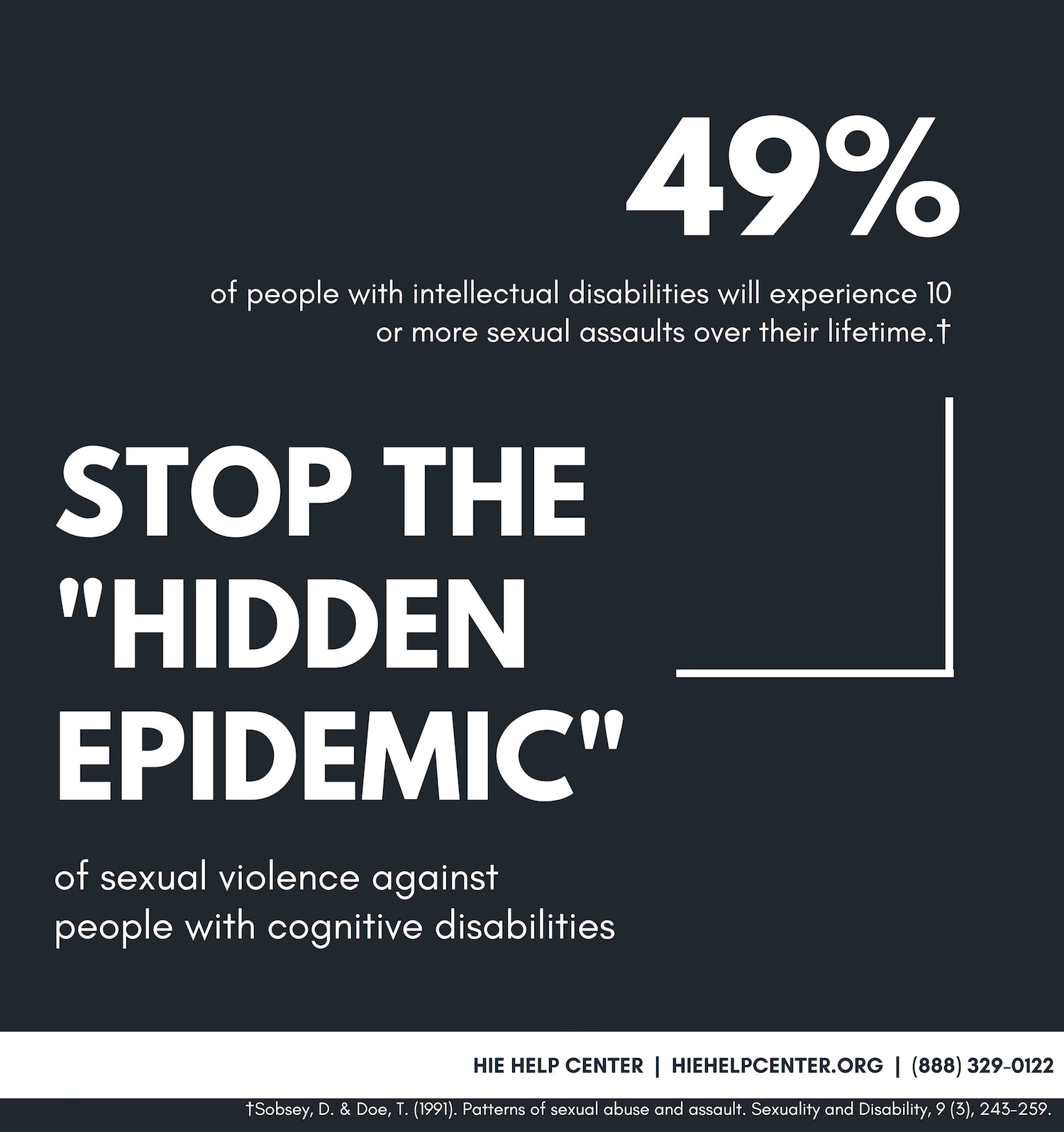 For their new series “Abused and Betrayed,” which addresses sexual abuse and violence against people with intellectual disabilities, NPR obtained previously unpublished data from the Justice Department. They found that the rate of sexual assault on people with intellectual disabilities is at least seven times the rate for people without disabilities. Among women with intellectual disabilities, it is about 12 times the rate. The data also showed that people with intellectual disabilities have a higher likelihood of being raped by someone they know, and of being assaulted repeatedly by the same perpetrator.
For their new series “Abused and Betrayed,” which addresses sexual abuse and violence against people with intellectual disabilities, NPR obtained previously unpublished data from the Justice Department. They found that the rate of sexual assault on people with intellectual disabilities is at least seven times the rate for people without disabilities. Among women with intellectual disabilities, it is about 12 times the rate. The data also showed that people with intellectual disabilities have a higher likelihood of being raped by someone they know, and of being assaulted repeatedly by the same perpetrator.
NPR’s Joseph Shapiro refers to this abuse as a “hidden epidemic,” but also acknowledges that it is “an open secret among people with intellectual disabilities, their families, and people who work with them.” Researchers have also been aware of the problem for some time – a 1991 study showed that 49% of people with intellectual disabilities will experience 10 or more sexual assaults over their lifetime (Sobsey and Doe, 1991).
Nevertheless, for the general public, the Abused and Betrayed series provides some much needed attention to this issue. And for people with intellectual disabilities, their families, and their caretakers, it provides more detailed insight into the nature of the problem.
Those with intellectual disabilities are particularly vulnerable to sexual abuse for the following reasons:
- Many people with intellectual disabilities require assistance with daily tasks, which may mean frequent contact with a variety of caretakers, transportation providers, etc. Some of these workers have predatory tendencies and see their clients as “easy targets” for assault.
- It may be difficult for people with intellectual disabilities to determine who they can trust and to recognize inappropriate behaviors.
- People with intellectual disabilities who are assaulted may not understand that reporting it could prevent continued abuse.
- Those who have speech and language disorders may be unable to clearly communicate about what is happening to them.
Survivors with Intellectual Disabilities Are Often Dismissed or Manipulated
Even when individuals with intellectual disabilities do report abuse, caretakers, authorities, or confidants often don’t believe them. In Georgia, Appeals Court Judge Christopher McFadden overturned the sentence of a convicted rapist despite physical signs of assault and DNA evidence. He justified this decision because the survivor, who had Down syndrome, did not “behave like a victim” or exhibit “visible distress.”
Moreover, perpetrators or those close to them may attempt to manipulate survivors with intellectual disabilities. NPR highlights the story of a woman named Pauline, who was raped by two boys: the adopted son and foster son of her longtime caretaker, Cheryl McClain. McClain called the police, but had a change of heart when she realized that the boys would be charged with rape. She tried to convince Pauline that it had been consensual sex. McClain told Pauline, “You wanted to do it,” and said that “A lady has to say ‘No.’” Fortunately, although Pauline became very upset and felt guilty about potentially sending the boys to jail, she stuck to her story, and adult protective services removed her from McClain’s home. However, many others with intellectual disabilities are successfully manipulated into thinking that a rape did not occur or was somehow their fault.
Dangers of Group Homes and State Institutions
Data from the Justice Department were collected from household surveys and didn’t take into account people with intellectual disabilities who live in group homes or state institutions. Because of this, and because sexual assault is generally thought to be an extremely under-reported crime, the rate of assault on people with intellectual disabilities is probably even higher than NPR’s estimate (as Shapiro himself emphasizes).
There are also reasons to believe that group homes and state institutions are particularly dangerous places for people with intellectual disabilities:
- They may spend time alone with many different people: visitors, other residents, and staff members.
- People who live in group homes and institutions may have more severe impairments than those who live on their own or with family/friends, making them less likely to successfully report abuse.
- Residents may not have access to a phone, the internet, or other means of contacting law enforcement.
Protecting Loved Ones from Sexual Abuse
Sexual assault is never the fault of the victim or of those close to the victim. However, if you have a family member with an intellectual disability, you may be wondering what you can do to protect them from the “hidden epidemic” of sexual abuse and violence. Although none of these measures will completely guarantee their safety, here are a few things to consider:
- When hiring caretakers, or indeed anyone who may be alone with your loved one, do a thorough background check. Of course, a clean background check is not a 100% guarantee that a person won’t commit assault, but it is a start. Personal references may also help.
- Group home and institution placements often require extra caution; research shows that abuse is more common in these facilities. Speak to current residents and their families. Do research on the home/institution in question. Extensively interview staff members about what procedures they have in place to prevent sexual assault and other types of abuse.
- If your family member begins to act differently or seems upset for some unknown reason, keep in mind that sexual abuse is one possible explanation. Consider whether someone they come into contact with frequently may be taking advantage of them. If they are communicative, try to ask them what’s wrong. Many find consulting with a doctor or psychologist beneficial.
- Take their claims seriously. Some survivors may be unable to provide a clear, detailed account of what happened. It is important to realize that although their stories may seem inconsistent, this may be due to confusion, manipulation, or fear of consequences. It should not be taken as an indication that they have fabricated the assault itself.
- Think about signing your family member up for a sexual education class for people with intellectual disabilities. This segment from the NPR series provides compelling reasons why this may be helpful in preventing abuse. You can also click here to learn about online courses.
- Check out these useful resources from The Arc, which is an organization for people with intellectual and developmental disabilities:
Reporting Sexual Assault:
If you or someone else may be in immediate danger, dial 911.
To be connected with sexual assault service providers in your area, you can contact the Rape, Abuse & Incest National Network (RAINN) at 1-800-656-HOPE (4673) or via their online chat system.
Alternatively, you can contact Adult Protective Services or a child welfare agency.
Survivors can also go to a local hospital for treatment and for an examination that may provide evidence against the perpetrator.
Sources:
The Arc: People with Intellectual Disability and Sexual Violence



Leave a Reply
You must be logged in to post a comment.